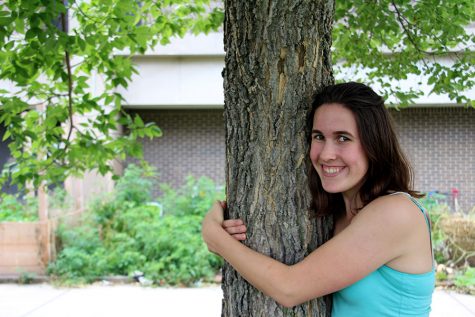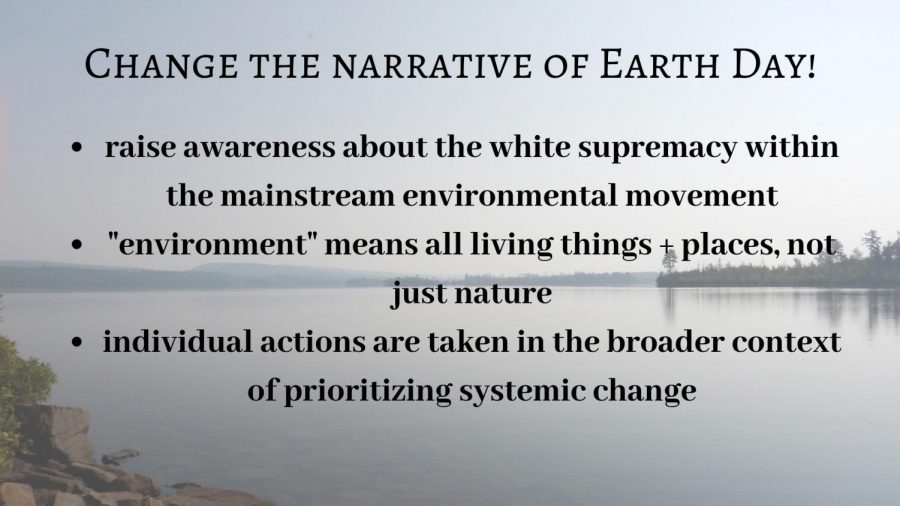Why I dislike Earth Day
Earth Day has a history of being exclusive to white, privileged people and today the way it is marketed perpetuates this trend. The narrative of Earth Day is centered around people showcasing their wilderness trips and focusing more heavily on individual eco-friendly lifestyle changes that are often inaccessible instead of recognizing and fighting the systems that create environmental problems.
I am an environmentalist, but I don’t like Earth Day. Don’t get me wrong, I love the Earth. I’ve grown up having the privilege to spend time in nature and value natural surroundings. My love of the outdoors has contributed to my passion for climate activism to this day. Yet despite how much I care about our environment, something about Earth Day makes me uneasy.
I support the concept of having a day focused on appreciating our Earth and the environment surrounding us. But I believe the narratives and culture surrounding our society’s Earth Day need to be criticized and changed. To explain this, I will start with Earth Day’s history.
Earth Day was created by Wisconsin Senator Gaylord Nelson in 1970 to raise awareness about the need for conservation and preserving clean air and water. That year, he instigated a national teach-in on the environment. People all over the country showed up to advocate for greater environmental protection. However indigenous people, who had been advocating for sustainability and mutual respect of all living things for years, protested that first Earth Day because they were left out of this conversation entirely. There was no acknowledgement that the land Nelson and other white environmentalists wanted to protect was stolen indigenous land, and that indigenous peoples’ access to their land and culture has always been severely limited.
Earth Day started the mainstream environmental movement that created momentum for the Clean Air and Water Act and further fostered support for National Parks. Yet people of color — historically barred from National Parks — still faced egregious discrimination when spending time in those places. Moreover, environmental legislation rarely acknowledges the fact that people of color are disproportionately affected by pollution, climate change, and other environmental problems.
Sparked by that first Earth Day, the narrative of mainstream environmentalism was created by white people, led by white people, and typically excludes people of color. There is a false presumption that white people created “environmentalism” when in fact many non-white cultures were advocating for the environment for far longer.
I believe that narrative upholds white supremacy. Consider the fact that according to a 2014 study, whites occupy 89% of leadership positions in environmental organizations today. And every year on Earth Day, few people are discussing or critiquing this.
Earth Day marketing perpetuates the narrative that “environment” only means nature. Every year, I see countless pictures on social media showcasing all of the most beautiful wilderness areas people have visited. While we do need to appreciate nature, this perpetuates the idea that people can only care about the environment if they have have visited these places. In reality, wilderness areas are still quite inaccessible to many people because of financial and time reasons. Additionally, racism against POC is still perpetuated in many wilderness places and it is therefore a cultural norm for primarily white people to go on outdoor trips. Focusing so heavily on the appreciation of wilderness areas on Earth Day alienates many POC and low-income people from celebrating it. It also makes us forget the reality that the environment is all around us, and we can appreciate it wherever we are — not just in natural parks.
I also find it problematic that on Earth Day, most people advocate for greener individual lifestyle changes instead of essential changes to the societal system that creates environmental problems. Although individual changes such as minimizing waste and eating plant-based diets are important, they are not going to prevent the worst effects of climate change by themselves. Maybe we should, for example, prioritize protesting the 100 companies that are creating 70% of greenhouse gas emissions.
Additionally, many individual lifestyle changes take privilege and focusing on this so heavily often excludes low-income communities and other marginalized groups. We have to stop presenting lifestyle changes as the most important things everyday people should do be environmentalists.
Finally, we need to acknowledge that, tragically, advocating for our Earth on only one day is not enough right now. We face the largest threat to the environment and humanity (climate change) and we have to change our economic system, political system, and social culture in order to fight it. I believe people must factor climate change considerations and mitigation efforts into their careers, life trajectories, privileges, opportunities, and communities to which they belong.
I feel that the way Earth Day is marketed and promoted encourages a complacency about leaving environmental advocacy to just one day instead of integrating the fight for environmental justice into our lives. Unfortunately, posting pictures about beautiful natural places and saying “Earth Day should be every day!” by itself just doesn’t cut it.
We need to change the narrative around what Earth Day represents. Instead of using it as an excuse to feel good about our love of nature and showcase beautiful wilderness areas, we should use it to challenge our own perception of “environmentalism” and advocate for environmental justice.
The Western version of environmentalism depends on the natural world being othered; wilderness is always juxtaposed with civilization. I believe this version of environmentalism will fail to save the environment, because it assumes that the exploitation of people and nature is the status quo. Instead we must center respect for the environment and all living things within society, including all human beings. This requires fighting against racism, classism, and other forms of oppression.
In order to protect and honor the Earth we must uplift the voices of people on the frontlines of environmental degradation — such as indigenous communities — who have been advocating for a culture of environmental sustainability for far longer than anyone else. We need to celebrate and respect the unique and diverse connections every person has with the environment throughout lifetimes — not just one day. We need to acknowledge the intersectionality of the issues such as climate change and challenge the ways in which the mainstream environmental movement upholds exclusivity and oppression.

As she begins her second year as Opinions editor and 3rd year on the newspaper staff, Sophia Manolis is more dedicated than ever to make sure new and returning...









